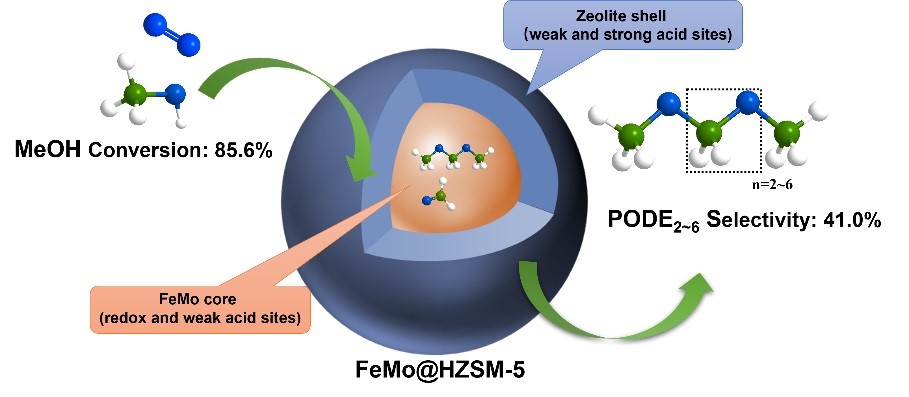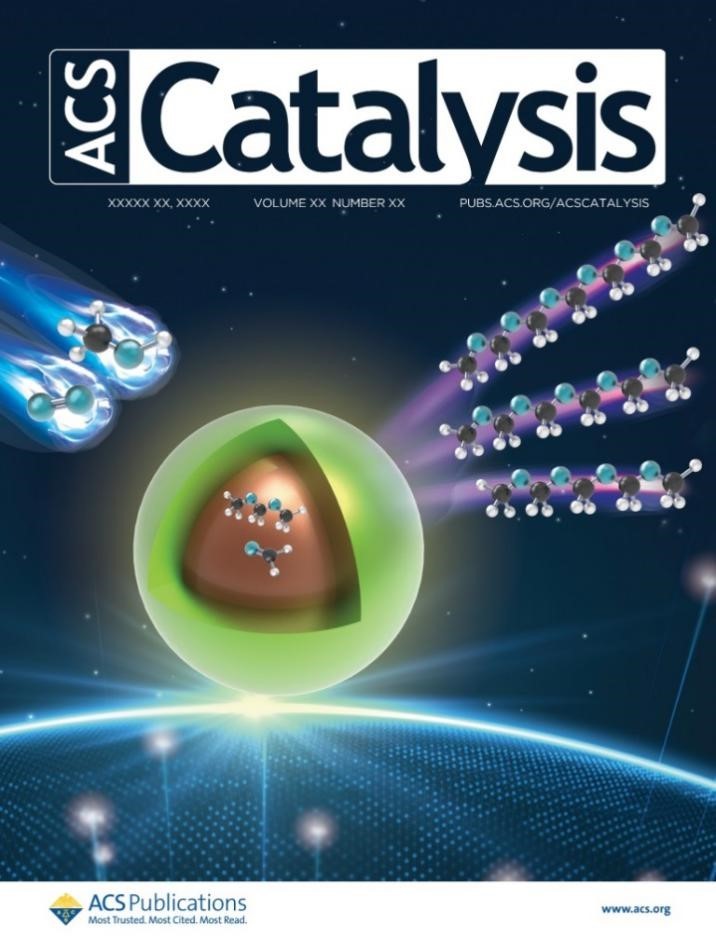Significant progress in the direct oxidation of methanol to oxygen-containing chemicals with long C-O chain
Recently, a research team led by Prof. Zhang Qingde from the Institute of Coal Chemistry (ICC) of the Chinese Academy of Sciences (CAS), has made significant breakthroughs in synthesizing PODEn through the oxidation of methanol. Based on the characteristics of the target reaction, they designed and regulated the distance and distribution of different acidic sites and redox active sites, constructing a highly synergistic ZSM-5 coated MoFe core-shell catalyst. This achievement has enabled the one-step synthesis of longer C-O chain PODEn through methanol oxidation, with a selectivity for PODE2-6 reaching 41.0% (Figure 1).
This work entitled “Direct Oxidation of Methanol to Polyoxymethylene Dimethyl Ethers over FeMo@HZSM‑5 Core−Shell Catalyst” was published in the ACS Catalysis (ACS Catalysis, 2024, 14: 1093-1097).
Due to stable C-H bonds in alcohol/ether molecules, higher reaction temperatures can complicate products or lead to deep oxidation, making efficient oxidation under mild conditions challenging. Current research on methanol oxidation mainly focuses on synthesizing short C-O chain products like dimethoxymethane (DMM), while controlling the growth of longer chains remains difficult. This study presents a core-shell catalyst with an iron molybdenum core and a zeolite shell, effectively achieving methanol oxidation to PODEn. Unlike traditional dual-bed and mixed catalysts, this core-shell structure enhances contact between reaction intermediates and the molecular sieve shell, leveraging the optimal distribution of varying acidic and redox-active sites. This promotes C-O chain growth and improves the selectivity of PODEn through precise adjustment of the core-to-shell ratio.
Characterizations of the catalyst's acidity (NH3-TPD, Py-IR, 27Al MAS NMR) indicated that medium-strength Brønsted acid sites are critical for synthesizing longer C-O chain products. Evaluating catalysts with different coating sequences and three-bed configurations showed that the unique sequence of core-shell structure and spatial confinement are essential for high selectivity in methanol oxidation to synthesize PODEn. Based on experimental design and characterization, the research team proposed a reaction pathway for methanol oxidation on the core-shell catalyst. By modulating the acidity of the molecular sieve shell, they effectively facilitated the controlled C-O chain growth at medium-strength Brønsted acid sites through methanol dehydration.
“Coal-based methanol serves as an important platform compound for the controlled growth of C-O chains through oxidation to produce high-value oxygen-containing chemicals and clean fuel additives. This process is environmentally friendly, with abundant downstream products and low carbon emissions, making it a key new research direction for the high-quality transformation of methanol. Therein, the direct oxidation of methanol to synthesize longer C-O chain polyoxymethylene dimethyl ethers (PODEn) features a short process and good atom economy, representing a novel and highly competitive green synthesis route.
This study opens up a unique and novel pathway for the controlled oxidation of methanol to achieve the growth of C-O chains for high-value oxygen-containing chemicals, while also providing new insights for the design of efficient catalysts.”, said Prof. Zhang Qingde.
The above work has been supported by the National Natural Science Foundation of China (22172187), the Central Guidance on Local Science and Technology Development Fund of Shanxi Province (No. YDZJSX2022A072), and the Youth Innovation Promotion Association, CAS (2014155).

Figure 1. Direct oxidation of methanol to PODEn over the core-shell catalyst.

Figure 2. A cover article published in ACS Catalysis.
© Institute of Coal Chemistry, Chinese Academy of Sciences, All Rights Reserved
Address: 27 South Taoyuan Road, Taiyuan, Shanxi, P.R.China
Tel: (86)351-4041627 Email: sxicc_en@sxicc.ac.cn